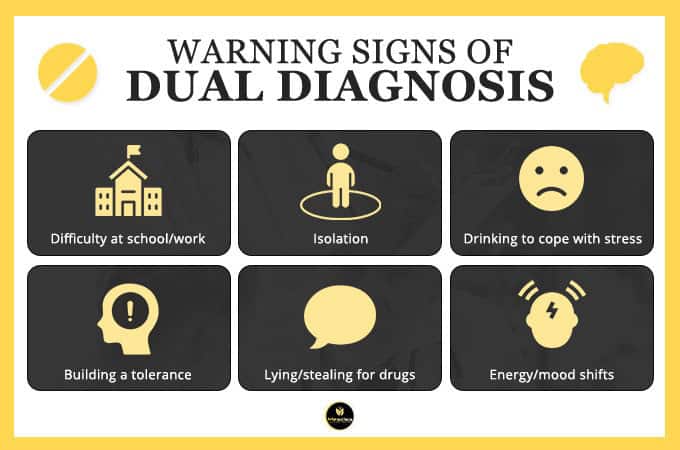Table of Contents
- 1 Co-occurring Disorders
- 2 What Is the Difference Between Dual Diagnosis Treatment Centers in Florida and Other Rehabs?
- 3 Signs and Symptoms of Dual diagnosis
- 4 Options for Treatment
- 5 Mental Illness and Substance Abuse Are Both Preventable
- 6 Receive Help At Our Dual Diagnosis Treatment Centers In Florida
- 7 References:
What Is Dual Diagnosis?
Diagnosis of two diseases treatment is a type of treatment in which a person is diagnosed with both a drug use disorder and mental health disorder (such as depressive disorders, anxiety attacks, bipolar disorders, etc.). Dual diagnosis treatment is very common these days since there is information everywhere.
If the two disorders interact, rehabilitation will become more difficult, resulting in a less favorable care outlook and a larger chance of serious health repercussions if not addressed effectively.

A relatively creative addiction recovery clinic can also help people with mental health difficulties. Until the 1990s, it was customary to believe that mental health illnesses and substance misuse, which can lead to dual diagnosis, could be treated in separate ways.
Until the 1990s, mental health care and substance abuse treatment were regarded as separate.
When these two elements come together, it’s common for clients to be unable to receive mental health therapy until they’ve obtained sobriety. Dual Diagnosis Treatment Modalities at The Miracles Recovery A Port St. Lucie Rehab Center Include:
- Psychiatric Assessment: You’ll meet with an expert mental health professional one-on-one to talk about your mental health and your dual diagnosis treatment program goals.
- Medical Detoxification: Our dual diagnosis program might involve medical drug and alcohol detox if necessary. This includes 24-hour clinical staff monitoring and medical supervision to safeguard your health and well-being throughout this critical stage of recovery.
- Evaluation and Management of Medication: One of our medical professionals will talk to you about your problems and medications to see whether you need to change any current dosages or if you need to be prescribed a new medication as part of your overall therapy.
- Group Therapy: You will share your stories and reflect on crucial issues including problem-solving, addiction, and healthy coping methods by meeting with other people who are suffering from mental illness and addiction.
- Consultations on nutrition: Nutrition can have a significant impact on mental health. Here, you and one of our highly qualified care staff members will review your eating habits and devise a strategy for maintaining a balanced diet in the future.
- Recreational Therapy: This evidence-based treatment aids patients in the development of life skills that will enable them to remain healthy and independent once treatment is completed.
- Programs with a 12-Step Approach: Patients can start working on a path to long-term sobriety by completing the 12 steps, which will last long after they’ve completed treatment.
- Community-Based Service Links: We are delighted to collaborate with the Orlando addiction recovery community to provide treatment beyond our programs. We’ll assist you in transitioning from our programs to further levels of care offered by local drug recovery and mental health professionals.
Co-occurring Disorders
Co-occurring disorders, often known as dual disorders, are conditions in which a person has both a substance use disorder and a mental health disorder. A dual diagnosis is another term for this situation.
What Are Co-occurring Disorders?
It might be challenging to diagnose co-occurring disorders. Substance abuse symptoms can disguise mental illness symptoms, and mental disease symptoms might be confused with substance abuse symptoms.
What Is the Difference Between Dual Diagnosis Treatment Centers in Florida and Other Rehabs?
By incorporating the finest practices of multiple diagnosis treatment, the 12-Step model is one of the most productive recovery models in the twenty-first century.
Addiction treatment facilities around the country are now able to manage substance misuse individuals with major mental health issues like bipolar disorder or schizophrenia.
Obtaining the proper dual diagnosis is not as simple as it once was. The Internet has made it easy to access information about all possible rehabilitation alternatives.
Finding the correct dual diagnosis program is challenging due to mental problems such as depression and personality disorders combined with opiate addiction. Dual diagnosis treatment centers in Florida will help you to find a proper treatment for these diagnoses.
Several addictive diseases can suggest that a person has struggled with alcoholism, drug addiction, gambling addiction, sexual addiction, and other issues. Assume you’ve decided to seek treatment for a dual diagnosis. If you are diagnosed with both a psychological disorder and a physical ailment, you are eligible for medical therapy. If you have a Dual Diagnosis, it’s critical to consider both your mental health and your addiction while you work through your recovery.
For the Best Possible Chance of Full Recovery, Your Care Should Include
- Drug addiction and mental health treatment specialists collaborate to meet your mental health and substance abuse requirements.
- Psychotherapy is important in the treatment of co-occurring illnesses, but prescription medication may be necessary as well.
Because the client had a dual diagnosis, he or she was not allowed to attend treatment until one of his or her symptoms had stabilized.
Sequential therapy has become less popular as studies have shown that it increases the chance of relapse in those with dual diagnoses.
You do not have a physical condition that does not meet the diagnostic criteria for mental health disorders if you have a dual diagnosis. Doctors use this diagnostic handbook as a therapy guide to diagnose and treat patients in a variety of clinical settings.
Finding a dual diagnosis treatment is far more difficult than recovering from a mental illness alone.
However, you should be aware that there are therapies and treatments on the market that can assist you in feeling better and completing your recovery. On your recovery journey, you should be surrounded by skilled and compassionate therapy staff.
This is what we at The Miracles Recovery A Port St. Lucie Rehab Center offer to you.

Signs and Symptoms of Dual diagnosis
To be officially diagnosed with Dual Diagnosis and receive a prescription medication type, you should consult a psychiatrist or an addiction specialist.
You can spot something off in yourself or someone you care about whether you are a professional personal trainer, work with children, or are a healthcare worker.
Warning Signs of Someone Struggling with Dual Diagnosis
- It is difficult to sustain good grades or work or school performance.
- Lying or stealing can be used to get rid of negative habits toward oneself or others.
- Refusing to drink, do drugs, or gamble but relapsing regularly.
- Reciting a habit’s regrets.
- Higher doses of medicines, stronger drinks, or more extreme tactics are all used to achieve a higher high.
- When attempting to stop using or lower the number of dangerous chemicals in one’s system.
Psychologically Disturbed People Might Exhibit These Symptoms
- Isolates himself/herself from others deftly, such as by consciously rejecting offers of friendship and assistance.
- Delusions occur when you believe in things that aren’t true or when you have sensory events that others don’t have (hallucinations).
- To cope with his anxiety, he feels driven to accomplish difficult physical and mental activities while adhering to elaborate routines and maintaining high standards of order.
- Due to behavioral disorders or mood swings, I have difficulty keeping a job, maintaining a home, or sustaining friendships.
- Moods and energy levels are rapidly shifting.
- To cope with stress or manage mood, he or she uses to drink, drugs, or compulsive behaviors.
All of these symptoms describe someone who needs a dual diagnosis treatment. For a definitive diagnosis, addiction treatment doctors with psychiatric credentials are the best to consult. In a dual diagnosis treatment drug rehab program, intake counselors and evaluation specialists assess your mental health before providing you with a treatment plan.
Options for Treatment
Almost all dual diagnosis treatments require a combination of medicine. Psychological disorders are diverse, and there are significant differences between them and substance abuse disorders.
Mental Illnesses and Addiction Are Often Diagnosed As:
- It is a mood disorders and illnesses that contributes significantly to social isolation.
- Generalized anxiety disorders, post- traumatic stress disorder, and obsessive-compulsive disorders are all examples of anxiety disorders.
- Borderline and antisocial personality disorders are mental conditions that make it difficult to form and maintain relationships.
- Eating disorders without eating disorders are a type of eating disorder
Treatment for dual diagnoses will be ineffective unless it tackles both the condition and your addiction background. Patients who have suffered from severe mental illnesses/dual diagnoses may benefit from 24-hour intense residential treatment programs.
To get the most out of an outpatient program , you must have a strong commitment to recovery. If your treatment plan isn’t continually monitored, you’re more likely to relapse. Before one can benefit from an outpatient treatment plan, some requirements must be satisfied. Physicians advise dual diagnosis treatment on the best pharmaceutical therapy.
Dual diagnosis treatment research providers appreciate the value of patients continuing to take the medicine they were prescribed in rehab. They also recognize the necessity of doing so once they have completed their treatment.
Learning about mental health, addiction , and substance misuse is an important aspect of your recovery from addiction. You must understand what you’re going through daily for your loved ones to be supportive of you.
Family counseling, 12-step meetings, and peer support groups are available to anyone with friends or family who need assistance with dual diagnosis treatment. Clients can also receive family therapy. This kind of program helps to involve families and teach them about how an addiction works.
Mental Illness and Substance Abuse Are Both Preventable
Individuals who abuse substances may exhibit some of the same symptoms as those who suffer from organic psychiatric diseases or dual diagnoses.
Examples include:
- Methamphetamine has been linked to psychiatric illnesses such as psychosis, mania, and Parkinson’s disease.
- The withdrawal of benzodiazepines caused the patients to experience significant anxiety.
- Over the weekend, I stopped using stimulants and became depressed.
- Korsakoff’s syndrome (chronic alcoholism causes cognitive and memory impairment) is a result of prolonged alcohol addiction.
Receive Help At Our Dual Diagnosis Treatment Centers In Florida
The dual diagnosis causes all of the repercussions of substance abuse with a mental condition. This is a mathematical probability. These are only a few of the many signs and symptoms of drug usage and addiction. Other causes could include toxicity-related punishment as a result of addiction, or co-occurring disorders.
Do you have a problem with alcohol abuse or drug addiction?? Do you believe you’re coping with a mental health problem at the same time? If you responded yes to any of the following questions, you’ll need dual-diagnosis therapy. If you or a loved one are suffering from trauma, alcohol abuse, anxiety, drug addiction, depression, ADHD, Post-Traumatic Stress Disorder or other behavioral health issues and mental health conditions, we can help.
At Miracles Recovery Center in Port Saint Lucie, FL , we provide the treatment options that you need to get healthy. We offer addiction treatment for people with comorbid illnesses. They’re quite effective. So don’t hesitate, Contact us and let us lead you through this difficult path of yours.
References:
- https://dualdiagnosis.org/dual-diagnosis-treatment/
- https://dualdiagnosis.org/10-things-you-should-know-about-treatment/
- https://www.nami.org/About-Mental-Illness/Common-with-Mental-Illness/Substance-Use-Disorders
- https://adf.org.au/insights/understanding-dual-diagnosis/
- https://www2.health.vic.gov.au/mental-health/practice-and-service-quality/specialist-responses/dual-diagnosis
- https://www.mind.org.uk/information-support/types-of-mental-health-problems/drugs-recreational-drugs-alcohol/dual-diagnosis/

